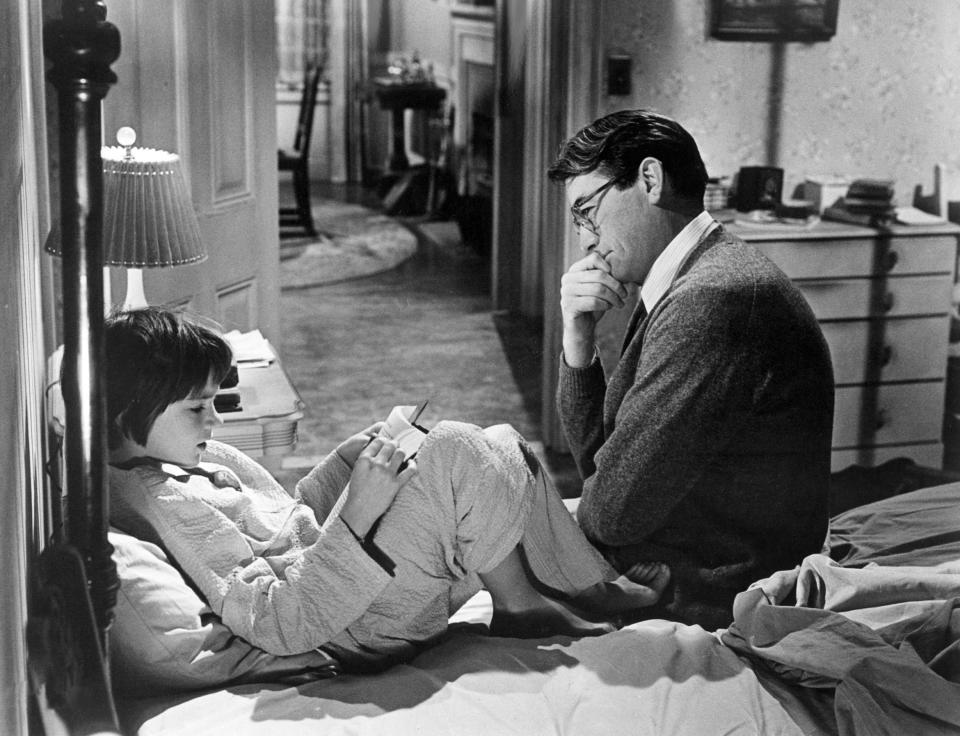Watching — and reading — Harper Lee’s seminal story, To Kill a Mockingbird, has been a rite of passage for multiple generations of American teens. But for the film’s star, Mary Badham, Mockingbird carries a personal weight that makes it difficult to revisit. “It’s too painful for me to watch now, because everyone’s gone,” Badham, now 70, tells Yahoo Entertainment ahead of the movie’s 60th anniversary. (To Kill a Mockingbird returns to theaters on Nov. 13 and 16 as part of TCM’s Big Screen Classics Series, overseen by TCM and Fathom Events.)
Born in Birmingham, Ala. in 1952, Badham was 9 when she was cast as Scout, the tomboy heroine of Lee’s semi-autobiographical 1960 novel, which depicts the racial tensions coursing through a small town in the pre-Civil Rights era Deep South. The film version came together quickly, with playwright Horton Foote adapting the book and director Robert Mulligan stepping behind the camera. Meanwhile, Hollywood icon Gregory Peck stepped up to play Scout’s father and justice-minded lawyer, Atticus Finch, who knowingly puts his family in jeopardy when he agrees to defend Tom Robinson (Brock Peters), a Black man accused of raping a white woman.
Premiering in theaters on Dec. 25, 1962, To Kill a Mockingbird was rapturously received by critics and audiences, and went on to earn eight Oscar nominations including a Best Supporting Actress nod for Badham, who became the youngest performer ever nominated in that category at the time. (Peck and Foote won Best Actor and Best Adapted Screenplay statues respectively.) It also served as a landmark example of mainstream Hollywood’s shifting depiction of race relations as the Civil Rights movement took hold, preceding films like In the Heat of the Night and Guess Who’s Coming to Dinner.
[embedded content]
Sixty years later, Badham is the only living cast member who still publicly talks about the film and its legacy, even if she doesn’t make a point of rewatching it. Robert Duvall — who played reclusive neighbor and object of Scout’s childhood fears, Boo Radley — is approaching his 92nd birthday and rarely gives interviews. And Badham’s onscreen brother, Philip Alford, is still alive, but withdrew from the spotlight years ago. “I think it was too close to him,” she says of Alford, who played Atticus’s eldest child, Jem. “I had a bigger view of Mockingbird as a story that was very important and needed to be carried forward, because its lessons still haven’t been learned. I guess he just didn’t want to participate in that.”
But Badham continues to participate in the discussions that Mockingbird still sparks. In addition to regularly appearing at events celebrating the film, she’s part of the ensemble in the national touring production of Aaron Sorkin’s Tony-winning stage adaptation. (Badham plays the Finch’s mean neighbor, Mrs. Dubose, which Ruth White performed in the film.) Speaking with Yahoo Entertainment on Election Day — as voters across the country were in the process of determining the future of some of the same causes at the center of Mockingbird — she admits that it’s not easy to be the steward of the movie’s legacy, especially at such a divisive time in America.
“It’s sad for me that we still are fighting these battles for women’s rights and racial issues and legal injustices,” she says. “I would have hoped we would have gotten through a lot of this, but obviously we haven’t. Sometimes it’s hard to be the only one to have to talk about the film, but the lessons [of Mockingbird] are so valuable. If I can keep one kid in school and focused on the right path, or if I can bring joy to one family that understands the story and the message and the importance, then that’s what keeps me going.”
“But I’m also 70 years old!” she adds with a laugh. “It’s not as easy as it used to be.”
A different world
Harper Lee drew on her own childhood in Monroeville, Ala. for To Kill a Mockingbird, but she could just have easily been writing about Badham’s early years in Birmingham. For much of her childhood, Alabama was a deeply segregated state that policed the lives of its Black residents. The youngest child in her family — her elder brother is Saturday Night Fever director John Badham — she remembers a then-traditional Southern upbringing that included two Black domestic workers who ran her household and looked after her while her parents were otherwise occupied.
“Mrs. Beatie Harrison and Mrs. Frankie McCall,” Badham recalls fondly. “They were wonderful human beings, and very influential on my life. They really formed who I am spiritually, and taught me the basics of what it is to be a young lady. Or at least they tried! I’m still not very good at it.”
It was during childhood excursions with her minders that Badham experienced some of her formative encounters with the deep-seated racism that permeated the roots of Deep South society. When she boarded ride a public bus with either Mrs. Harrison or Mrs. McCall, they would have to sit in the very back while she remained in the “Whites Only” section towards the front. Even at a young age, Badham understood she was witnessing an injustice — but she couldn’t talk about it with her parents or elders.
“That was not a discussion that could be had,” she emphasizes. “It was not something a child was able to discuss. They would only say: ‘Now, darling.’ And that really meant: ‘Shut your mouth.'”
Badham was 3 years old when Rosa Parks boarded a bus in Montgomery and took a seat in the “Whites Only” section — an act of defiance that helped lay the foundation for the nascent Civil Rights movement. But it would be years before she learned about what was happening in her state. “I was kept away from all that,” she recalls. “There was an absolute blanket on a lot that was going on, and wouldn’t be ferreted out for years. The change that did happen took too long.”
As a child, Badham didn’t express an interest in performing. But her mother had been a stage actress prior to getting married, and was encouraged to bring her daughter to an open casting call for the film version of To Kill a Mockingbird. From the beginning of the process, she felt a kinship with the character she’d end up playing. “It was so close to who I really was as a child,” she says while thinking back on her earliest memories of reading Scout’s scenes. “I’d rather be outside than in, and I’d rather be in a pair of jeans than a dress. She was very much like I was.”
As for the “real” Scout, Badham says that Lee largely kept her distance from her onscreen alter ego. “I vaguely remember that she was there, but only because of photographs,” the actress recalls, adding that she and the late author eventually re-connected as adults. “We didn’t have a real relationship until much later, before she passed. I would go visit her at her nursing home in Alabama.” (Lee died in 2016, one year after the release of Go Set a Watchmen, an earlier version of the novel that became To Kill a Mockingbird. Badham declines to comment on the circumstances of that book’s controversial publication.)
Going Hollywood
Although the filmmakers originally hoped to shoot Mockingbird in Lee’s hometown, Monroeville had changed too much to reflect the story’s Depression-era time period. So Badham joined the rest of the cast and crew in Los Angeles, where the fictional Alabama town of Maycomb was constructed on the Universal Studios backlot. Once upon a time in Hollywood, child actors like Judy Garland and Shirley Temple were worked to the bone by unforgiving studio executives. But by the time Badham joined the industry in the latter years of the studio system, performers her age followed carefully regained schedules.
“I had a student welfare worker on every film that I ever did,” she recalls. “The hours were very strict, and whenever they called ‘cut’ on a scene, I was expected to go immediately to the schoolroom. You could only work so many hours, and couldn’t go beyond that. I was blessed to be here at a time when they protected children.”
On set, Mulligan made a point to let the kid actors behave like actual kids, often refraining from telling them about what would happen in a given scene in order to capture their natural reactions on camera. That approach yielded one of the film’s best-remembered moments — Scout’s gentle “Hey, Boo,” when she finally sees Boo Radley’s face after he’s spent much of the movie as her boogeyman. Badham confirms that scene was the first time she saw Duvall in character.
[embedded content]
“He opened the door, and I just said, ‘Hey, Boo,'” she says wistfully, adding that she only worked with Duvall for two days during production. “Robert Mulligan was so good with stuff like that. And he never talked down to us as children — he would squat down in front of us and say, ‘The camera is going to be here and you’re going to move from here to there,’ but he never told us how to react.”
When the cameras weren’t rolling — and she wasn’t in the on-set classroom — Badham remembers trying to horse around with Alford and John Megna, who played the third member of their trio, Dill, a character that Lee famous modeled after her childhood friend, Truman Capote. “The boys and I used to argue a lot, because they wanted to play and do stuff, and didn’t want this little girl tagging along with them. Evidently, we would have these knockdown, drag-out fights, although I don’t remember any of that!” (Megna died in 1995.)
According to Badham, Alford and Megna used the scene where Scout takes a ride in a rubber tire as a way to settle the score. “What you can’t see in the shot is that off to the side, there was a utility truck and they decided they were going to just do away with me by pushing me into it,” she says, laughing. “Mr. Mulligan was so afraid that I was going to get hurt that he had my stunt double — who was a jockey — come in and do the scene. So you see me at the very beginning and end of the tire scene, but not in the middle. My stunt double also did the fight scene at the end of the movie where Scout’s in the ham costume, because they were afraid that I’d get hurt there as well.”
“Your father’s passing”
[embedded content]
Hollywood legend has it that both Jimmy Stewart and Rock Hudson were considered for the role of Atticus Finch before the script landed in Peck’s lap. Sixty years later, it’s hard to imagine anyone else delivering Mockingbird’s famous courtroom summation, where Atticus tries and fails to make the residents of Maycomb see past their prejudices. Badham wasn’t on set when Peck delivered the speech — she says that the young actors were largely kept away from watching the courtroom scenes — but she’s never forgotten the experience of seeing it onscreen for the first time.
“I just remember sitting there weeping,” she recalls. “It really was a very emotional moment for me. And I think my beliefs now are very much centered on those feelings that I had then. The injustices and the subtle evils that we still see now just percolated to the top.” In fact, when she returned to Alabama after filming Mockingbird, Badham realized she could no longer tolerate the bigoted injustices built into the city’s daily life. When she turned 14, she left Birmingham to attend boarding school, and tried not to look back. “I just couldn’t stay there,” she says simply. “I had to get out.”
According to Badham, Peck ended up playing the role of her father figure for the rest of his life. “Atticus was his favorite role — it was the one who said the most about who he was and what he believed in.” The two remained friends until his death in 2003, even after she took an extended break from acting for other pursuits. “The system changed so much by the time I was older,” she explains. “The scripts I was given were not pleasant, and all of the protections and been pulled back. I didn’t feel safe, so I just said, ‘Forget this.’ By then, I had other things that were meaningful to me.”
Even in those wilderness years, Atticus’s voice provided her with a guiding light — a light that eventually guided her back to Mockingbird when she received the offer to join the touring production of the Broadway show. “I don’t have an agent, and I don’t have a manger: I just feel I have these things that I’m supposed to do.”
“There’s a lot of hope in this story, and there’s a lot of great lessons in this story,” Badham continues. “That’s why I decided to do the play: it speaks to the truth of our history. If you look back at the history of this country, this is what people lived through. And people are still being thrown in jail because of the color of their skin. It’s just not right.”
Battle lines
To this day, most young readers encounter To Kill a Mockingbird for the first time in school, where both the novel and the film have long been curriculum staples. But Lee’s tale also remains of the most-challenged books in American schools, and not just in the South where conservative politicians are trying to re-shape how Black history is taught. Earlier this year, California’s Burbank Unified School District pulled Mockingbird off of required reading lists after parents expressed concerns about its language, including racial epithets. (The N-word appears in Lee’s text and is also heard in the film.)
Badham says she understands why the book might upset both conservative and progressive parents, and admits that she sometimes sees children today struggle to connect to Lee’s story of a now-distant time and place. “But I still think it’s very important for them to read this book,” she stresses. “The thing that some parents don’t understand is that children are interested in what the kids in the book are doing. And then as they get older, they may broaden their view of the story. That’s also where parenting comes in. It’s essential that parents participate and help explain things. They can’t take a hands-off approach.”
“But to ban the book, no,” Badham continues. “Then we’re going back to the old days, when control was the issue. Banning the book doesn’t help — it hurts. I know that there are families where the book, the film and now the play have become a central force. Atticus has become their role model, and I know many lawyers who have become lawyers because of him. So there’s a lot of good that can come out of this. And a lot of people who want to ban the book haven’t read it! They’ll pick out words they’ve been given and say, ‘Oh, it has this in it.’ But I say that you need to read the book. I’ve always believed that ignorance is the root of all evil, and education is the key to freedom.”
And Badham plans to continue telling and re-telling Scout’s story for as long as she’s able. “It’s my life’s work basically, and not necessarily of my choosing — it’s just the way that it is,” she muses. “The people involved in this film were very passionate about their belief in it and the messages that came with it. It’s hard that they’re all gone. I just hope I’m doing the job that I’m supposed to be doing. I think I am.”
To Kill a Mockingbird returns to theaters on Nov. 13 and 16; visit Fathom Events for showtime and ticket information




